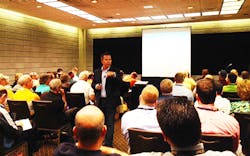Kenny Chapman attacks perfection, procrastination and paralysis
NASHVILLE — Matt Michel, CEO of the Service Round Table, decided to end the SRT’s portion of the Comfortech Show here with a bang — the very last seminar would be given by well-known plumbing contractor, author and speaker Kenny Chapman. Chapman was nervous. He thought he’d end up talking to an audience composed of his wife, Christy, and Michel. It was standing room only even after additional chairs were brought into the room.
Chapman, a Colorado plumbing contractor who’s become wildly successful as a speaker, connects with an audience by telling them things that make sense and that are easily understood and embraced. Be the very best that you can be at what you’re doing even if you don’t like it. We tell ourselves a lot of lies. We don’t have an industry problem; the problems are at (and can be solved at) the contractor level. Buy Michael Gerber’s book, The E-Myth, and devour it. Create systems for your company and then have people run the systems.
In the middle of his session, Chapman delivered a great line even for him. While talking about buying his drain cleaning business back in the early ‘90s, Chapman recalled, “I didn’t own a business, I owned a job and it was a bad job because I worked for myself and I’m a lunatic.”
Chapman focused his talk about taking action and all the things that cause procrastination and paralysis. You must take action to get what you want, he said.
Eighty-five percent of what we do is out of habit, he said, positive, negative or neutral. It’s your morning routine in the office, how you take your coffee, how you deal with your staff. Be conscious of your habits or they’ll kick in and you’ll operate on remote control. Time management is a myth; it’s how you manage yourself and how you choose to allocate your time.
Time is the only resource we all share equally and some people get a lot done and other people struggle. Richard Branson manages his time because, he claims, he has never done laundry and never gone to a grocery store.
“It’s a matter of choices on what we do with our time,” Chapman noted.
Procrastination is a productivity killer but the biggest killer is perfection because perfection doesn’t exist in real life and it causes procrastination. Excellence and perfection fight against each other. Chapman urged the contractors to get something 80% done and then pull the trigger. The rest can be fixed along the way. People will do the best job they can with the information that they have. If you focus on trying to consistently execute at a high level, the competition will be eliminated. So your price book is only 80% done? Just put it out there, Chapman urged, and then fix it as you need to.
You’re never done because as you make progress, the horizon moves with you. Figure out what’s important and then what’s most important. Chapman urged the contractors to focus and schedule three big things they need to do every week. But wait, the contractors protested, they have 1,000 things to do this week. Prioritize and focus on those three most important items, Chapman reiterated.
Protect your time, he said. Time is an asset. Steve Jobs used to say that he was most proud of the things that Apple didn’t do. It’s ok to tell people no; nothing bad will happen to you.
Don’t underestimate the value of free time, he said. Don’t mistake being busy with doing something valuable.
Finally, he asked rhetorical questions designed to make the contractors think about how they prioritized their lives and used their time. If you knew that you could never retire, how would that change your current decision-making? If you knew that you could never earn more than $40,000 a year, how would that affect your current decision-making? And if you had to pay $40,000 a year to work, how would that affect your decision-making?
About the Author
Robert P. Mader
Bob Mader is the Editorial Director for Penton's mechanical systems brands, including CONTRACTOR magazine, Contracting Business and HPAC Engineering, all of which are part of Penton’s Energy and Buildings Group. He has been with CONTRACTOR since 1984 and with Penton since 2001. His passions are helping contractors improve their businesses, saving energy and the issue of safeguarding our drinking water. He is a graduate of the University of Notre Dame with an A.B. in American Studies with a Communications Concentration.
